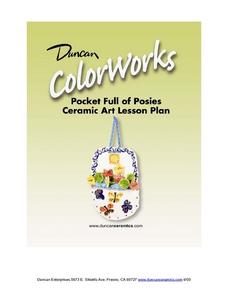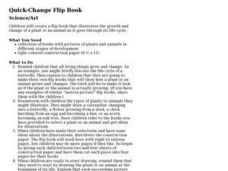Curated OER
Building a Butterfly Garden
Students examine the habitat and life cycle of a butterfly. In this early childhood lesson plan, students identify the parts of a butterfly, as well as the stages of the butterfly life cycle. Students also plant a garden in which they...
Curated OER
Dirt Babies
Dirt babies are an excellent way to show young botanists the plant life cycle. They explore the functions and industry behind grasses before growing some of their own. Use the informational text here and consider implementing some...
Curated OER
Plant Life Cycle
Fourth graders explore the plant life cycle. They discuss the sequence of events in the life cycle of the plant and illustrate how the life cycle never ends. Students explore the importance of water, sunlight, and nutrients during the...
Minnesota Department of Natural Resoures
Tree Life
The life of a tree is the focus of a packet consisting of several activities all covering a different subject. Second graders measure shadows, make pinecone critters, write poems, count rings, complete a word search, play tree tag, and...
Curated OER
Lesson 3: Life Cycle of Brassica Plants
Students investigate the life cycle of brassica plants. In this science lesson, students observe each stage in the life cycle of their plant. Students record their observations and graph the data. Students
Curated OER
Life Cycle: Diversity in a Balance 4th Grade Workbook
In this life cycle workbook, 5th graders examine plant and animal cells, classification of organisms, human biology, photosynthesis, and natural environments. 21 different activities make up the Life Cycle Workbook.
Biology Junction
Plant Diversity
Ginkgo trees existed for more than 350 million years, and, at this time, only one species still remains. While plant diversity generally increases over geologic time, some interesting exceptions occur. Young scientists learn about plant...
Curated OER
Plant Power
Here is an opportunity for your first graders to take a close look at plants: what they need to survive, how they grow, and the names of each plant part. The book, Corduroy's Garden is used to open the lesson. Then, youngsters utilize...
Virginia Department of Education
The Cell Cycle and Mitosis
What a packed lesson! Provide your class with the opportunity to learn about the cell cycle in several exciting ways. Biologists first learn about the theory behind mitosis, then proceed to view onion tips under the microscope and create...
Curated OER
Sowing Seeds: the Beginning of the Fast Plant Life Cycle
Students plant seeds, observe and tend plants. They identify major plant parts, how to germinate and troubleshoot problems with plants; and, that plants need water, light, and soil nutrients to thrive. They create a Plant Growth Data Log.
Curated OER
Life Cycles
Students explore the parts of a flower and pollination of flowers. In this plants instructional activity, students use an interactive whiteboard to label the parts of a plant and the functions of each part. Students complete a worksheet...
Curated OER
Photosynthesis:The Calvin Cycle
From the light reaction to the Calvin cycle, this presentation contains information about the various stages of photosynthesis. This is a great supplement to some of the biochemistry-heavy presentations about the specific mechanisms....
Curated OER
Leaves, the Sun, and the Water Cycle
As a way to combine life and physical science, or simply as an investigation of plant transpiration, this lesson is sure to inspire! Middle schoolers capture the moisture given off by plants that are placed in different conditions. They...
Baylor College
Needs of Plants
What better way to learn about plant life than by creating a class garden? Young botanists start with a brief discussion about radishes before planting seeds and watching them grow. To determine the importance of water, sunlight, and...
Curated OER
Flower Power
An engaging, multi-session art and science lesson awaits your class. Within this lesson, you'll find everything you need to implement the plan. They go on a nature walk around their school, and must identify many living and non-living...
Curated OER
PLANT LIFE CYCLES
Student learns about the life cycle of plants by watching a time-lapse video. This activity provides students with further evidence that all living things grow and change as they progress through their life cycle.
Curated OER
Pocket Full of Posies: Ceramics
After studying the plant or flower life cycle, have the class create a basket of flowers out of clay. They hone their ceramics skills while they push, pull, then paint clay to look like flowers they've seen in nature. There are several...
Curated OER
The Birds of a Feather Flock Together
Fifth graders identify all parts of an egg, and explore their importance to the life cycle of a chicken. Learners compare all sorts of birds and place them in categories based on what they look like. This five-day lesson effectively...
Curated OER
Life Cycles
Learners identify and explain the parts of a flower and their role in the life cycle of flowering plants. In this online plant biology lesson, students explore the processes of pollination, seed dispersal, and germination. Extension...
Curated OER
Science Crossword Puzzles - The Life Cycle of the Monarch Butterfly
In this science crossword puzzle worksheet, 3rd graders determine the answer to 7 clues using vocabulary associated with the life cycle of Monarch butterfly.
Curated OER
Quick-Change Flip Book
Students create flip books that illustrate the growth and change of a plant or an animal as it goes through its life cycle.
Curated OER
Monarch Migration
Third graders investigate the life cycle of the Monarch butterfly. They experiment with various tools to simulate the mouth parts of insects, conduct research, record their observations of butterflies hatching, write a play, complete...
It's About Time
The Nitrogen and Phosphorous Cycles
How do we affect the ecosystem, and what can we do to preserve it? Pupils explore chemicals that promote and inhibit plant growth, then discuss the importance of nitrogen and phosphorus to the survival of organisms and describe how...
Curated OER
The Dirt on Plants
Students draw and label the four parts of a plant. They describe changes that are part of the common life cycle. Students follow various one and two step directions. They are asked to discuss that they can recall about plants.
























